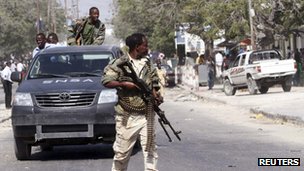Al-Qaeda 'could target UK youths' Foreign fighters may be seen as a source of manpower in Somalia, the report suggests
British youths from African communities could become radicalised as al-Qaeda looks to Africa to build its strength, the Rusi think tank has suggested.
It says such a development would pose new challenges for UK and other Western intelligence services.
It warns of potential for new or greater radicalisation among British youths from the Somali and other east and west African communities.
The government said it was tackling home-grown terrorist threats.
Radicalisation has already been seen during the past 15 years among some young members of the Pakistani, North African and Indian communities in Britain, the report published by the Royal United Services Institute suggests.
Report author Valentina Soria said: "Most significant is the potential for radicalisation and then mobilisation of a new subset of British youths."
"The UK could soon be facing much greater radicalisation among the Somali minority and new radicalisation in some sections of other communities from east and west African countries."
“The UK cannot expect to remain immune from the 'spill-over' effects of events that could reshape part of the African continent”
Valentina Soria
Rusi report author
This was because the "jihadist challenge" may be migrating across Saharan and Sub-Saharan Africa as the al-Qaeda leadership – weakened by the death of Osama Bin Laden – looks to partnerships to re-group and re-energise itself, the report says.
Western intelligence services have acknowledged that the terror threat has changed and shifted, including into Africa, with Somalia a particular focus of concern.
But this report suggests those intelligence services also face new challenges tracking the threat if "jihadism evolves and disperses into territories of ungoverned, or loosely governed, space across large stretches of the African continent".
Regarding Somalia, Ms Soria said foreign fighters now represented "a valuable, albeit still limited, source of manpower for al-Shabab", a Somali hardline Islamist group banned in the UK.
'Operational necessity'
It is "possible that the use of new terror tactics may have further alienated its African recruits who are mostly reluctant to get involved in suicide bombings", she said.
"As a result, the recruitment of foreign fighters could be read as a choice of operational necessity rather than as a move aimed to make al-Shabab the next al-Qaida."
She added that the "dynamics of jihadism in Africa may provoke direct terrorist attacks inside the UK" but said there had been "no direct public evidence of this happening".
Ms Soria said: "The UK cannot expect to remain immune from the 'spill-over' effects of events that could reshape part of the African continent."
A government spokeswoman said: "We are tackling the threat of home-grown terrorism with our new prevent strategy, which is challenging extremist ideology and tackling the radicalisation of vulnerable people.
"We are also working with governments in Africa to improve their capacity to tackle the terrorist threat."


